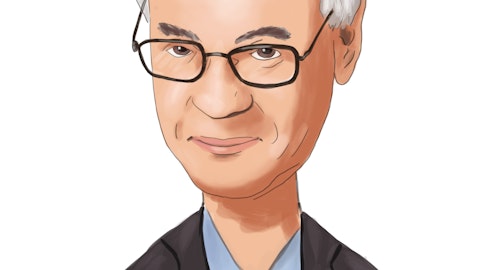Steve Gardner: Sure, Gary. There’s a lot to unwrap there. Let me see if I see – if I could try to cover it. I think that as I mentioned in the prepared remarks, we’ve been a little bit surprised at just how aggressive some lenders are on term and structure. I mean we understand rate. But we kind of scratch our heads on what some of the things are that we’re seeing. But maybe that’s just the fact that there is relatively muted demand out there. From the pricing standpoint, I think I nearly fall out of my chair every day when I see what some people are pricing deposits, earnings credits on some specific lines of business. It really – we walk away and say, boy that is some really short-term thinking, but maybe under dynamics that are different than what we are experiencing or maybe what they’re thinking.
I’m just not sure. From the talent standpoint, our team is strong, but we are always seeking to upgrade where we can. We historically have not gone out and done the team about that thing, just historically hasn’t really – the return on investment just isn’t there. M&A standpoint, there’s a lot of headwinds to M&A right now, whether it’s our own valuation and multiple, whether it’s just volatility in the stock market and interest rates. And then, of course, that rolls into the impact of – on fair value accounting and how that’s going to impact capital ratios in M&A. And then probably the biggest unknown and uncertainty is just the regulatory environment and how long it is going to actually take, to get a transaction done. And so, that’s playing into it as well.
And so, it’s generally been relatively muted as far as the level of M&A activity, which everybody is well aware of. But the great thing is that it allows some of your colleagues, to spend more time with us being “helpful” on ideas.
Gary Tenner: Steve, I appreciate your thoughts. Thanks.
Steve Gardner: Sure.
Operator: [Operator Instructions]. The next question is from David Feaster with Raymond James. Please go ahead.
David Feaster: Hi, good morning everybody.
Steve Gardner: Hi, David.
David Feaster: Maybe just two quick ones. I think we’ve hammered home the impact of Fed cuts. But I’m just curious, maybe touching on some of the ancillary impacts. Obviously, there’s going to be a nice improvement in sentiment broadly if we do start getting cuts. So I’m just curious, how do you think about Fed cuts, impacting other parts of the income statement, or balance sheet from loan growth to fee revenue growth, from escrow? And obviously, we get some benefit in earning credit side, too, on the expense side. So just maybe some of your thoughts around, some of those dynamics if we do start getting a declining rate environment?
Steve Gardner: Yes. I think that what is going to be the driver of that declining rate environment is that inflation starting to slowly come down, or are we going to be seeing widespread disinflation, which could be certainly problematic. Is it, because suddenly jobs are not expanding, but are contracting? So, I think what’s going to be the driver of that. I think, obviously, all of us are hopeful that it’s a soft landing. But most all of us prognosticators forecast have generally been wrong. So from our standpoint, we’re prepared for a variety of scenarios and situations. We generally manage the balance sheet relatively neutral, from an interest rate risk standpoint. And I think we’re carrying capital levels that protect us from the tail risks that may occur.
If you get the kind of the soft landing and the nice gradual decline in interest rates. And if somebody can point to a time in history where that’s actually occurred, that would be exciting. But if that does occur, yes, you’d probably see increased activity around areas like the – our escrow business and 1031 exchange activity. I would think that in a declining rate environment, one that’s gradual you would see probably improved deposit flows. The money market funds and other higher-yielding alternatives, not being as attractive and that would certainly benefit us and the like. You’d probably see potentially some increase in overall credit demand, if that type of scenario were to play out.
David Feaster: Okay. That’s helpful. And then maybe just touching on – going back to kind of the competitive landscape. I mean origination slowed down materially. And it was really across the board. I mean, you’ve obviously – I mean you’ve had a conservative and cautious outlook for a long time, and it’s been the right call. I’m curious how much of the decline in originations is strategic, where it’s maybe less appetite for demand, or even the pulse of your clients. Like I’m curious, what are you hearing from clients? Are they – is there uncertainty in the market and they’re just holding out on investing? And then is there any mines where you’re seeing more competition for new credit?
Steve Gardner: Yes, I think there’s – its complex, as always. There are no simple answers. Certainly, you’re right. We made a conscientious decision to pretty significantly slow new loan activity going back to early 2022. That’s always a balancing act, and you’re trying to make adjustments along the way. I don’t think that any of us were too pleased, about originating $45 million in the first quarter. But again, that, I think, owes to the discipline that we have around structure, pricing and the luck. I think from our client standpoint, they’re generating good cash flow, but there doesn’t seem to be a lot of excitement or enthusiasm about expanding operations beyond where they are, they’re still dealing with the effects of inflation and a competitive labor environment.
And so business owners are pretty pleased with the cash flow and profitability they’re generating now, but there doesn’t seem a lot of enthusiasm for our expansion, if you will. I certainly got to – have to think that some of the domestic geopolitical risks are at play and an election this year, and those dynamics and for others, international geopolitical risks influence their decision-making at their businesses. So it’s a multipronged question, and dynamic that’s going on in the market. But as I said, we began to see some incremental credit opportunities that were attractive and that we’re hopeful that will come to fruition. And we can execute on, because we certainly have the capital, and the ability to add high-quality loan relationships to the book.
David Feaster: That’s great. And maybe last one. You’ve got a great reputation as an aggressive manager of credit, saw that this quarter with the proactive sales of some substandard credits. CRE – a couple of CRE and some in franchise. I’m just curious, was there anything within those loans specific, or any commonalities among them that drove the sale. And then, just on continued sales, like what’s, the market like and whether there might be, some interest in some additional potential problem loans sales in the coming quarters?
Steve Gardner: Yes. There wasn’t really any common denominator amongst any of those individual credits. They were specific to that borrower, that business, that property that we sold. Look, we’ve utilized loan sales for a long period of time. We’re going to continue to. We generally don’t broadly market them. We’ve tried one or two firms, I don’t think it’s – it didn’t necessarily work out the way that we had expected. And we’ve gone back to a number of small funds, high net worth individuals that are involved in this business. And we get pretty good execution there. So, we’ll continue to consider it. We’ll – we put loans out to bid pretty regularly, and then decide on what the best course of action is.
David Feaster: All right. That’s helpful. Thank you.
Operator: This concludes our question-and-answer session. I would like to turn the conference back over to Steve Gardner for any closing remarks.
Steve Gardner: Very good. Thank you, Gary. Look forward to seeing folks at various conferences. Have a good week.
Operator: The conference has now concluded. Thank you for attending today’s presentation. You may now disconnect.
Follow Pacific Premier Bancorp Inc (NASDAQ:PPBI)
Follow Pacific Premier Bancorp Inc (NASDAQ:PPBI)
Receive real-time insider trading and news alerts



